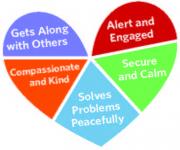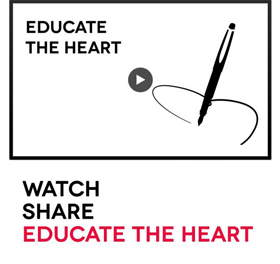The Five Positive Human Qualities of Heart-Mind Well-Being

Tea and desserts in hand, 26 women who work in early childhood education gathered to listen and learn about the Heart-Mind Index . As the community developer for the Heart-Mind Index Pilot Project , I felt privileged to sit amongst the participants observing. The local facilitator asked the audience to come up with definitions for each of the five qualities that the Index measures.

What I heard in the definitions were stories. Stories of children who clearly demonstrated strong, positive behaviours in each area and stories of children (and adults) who were struggling in situations that took them to the limits of their social and emotional skills.
The audience of early childhood educators smiled with camaraderie at the descriptions of young children using “words rather than body parts” to solve problems.
Many are reminded daily that children around the age of two are inherently physical before they “un-learn” this behaviour and learn how to solve problems peacefully. They swapped shared experiences of difficult transitions for both children and their parents at drop off and pick up times. Some children (and some parents) having the emotional skills to be trusting and flexible while some still need practice and growth to be secure and calm.
There were enough heart-warming stories about children who consistently show high levels of compassion and kindness to remind us that the dark, frightening stories of bullying, aggression and narcissism are not the norm. For example, they spoke of common situations where children in the afterschool program would arrive at the center and hear a young toddler crying and immediately go to offer comfort.
Children have a variety of personalities and temperaments and we can celebrate the range of social and emotional strengths that help children to be engaged and flourish in their lives. Heart-Mind Well-being refers to the balance between educating the mind and educating the heart. While there is a great focus in our society on academic achievement, research has demonstrated the positive impacts of social and emotional learning and, in fact, that heart and mind learning are interconnected.
For each of the five positive human qualities, there is a mass of research and resources to support parents and professionals to build social and emotional skills. When we look at the research through the stories of children – we can appreciate both the importance of our collective roles in supporting their development as well as the evidence that we have strength in children, in families and in communities upon which to build on.
The Heart-Mind Index is fostering a curiosity in communities about Heart-Mind Well-being. Resources and learning opportunities are being gathered by the Dalai Lama Center for Peace and Education. The Heart-Mind 2014 Conference, for example, will be a special opportunity to learn more about the science of kindness.







Comments
Post new comment